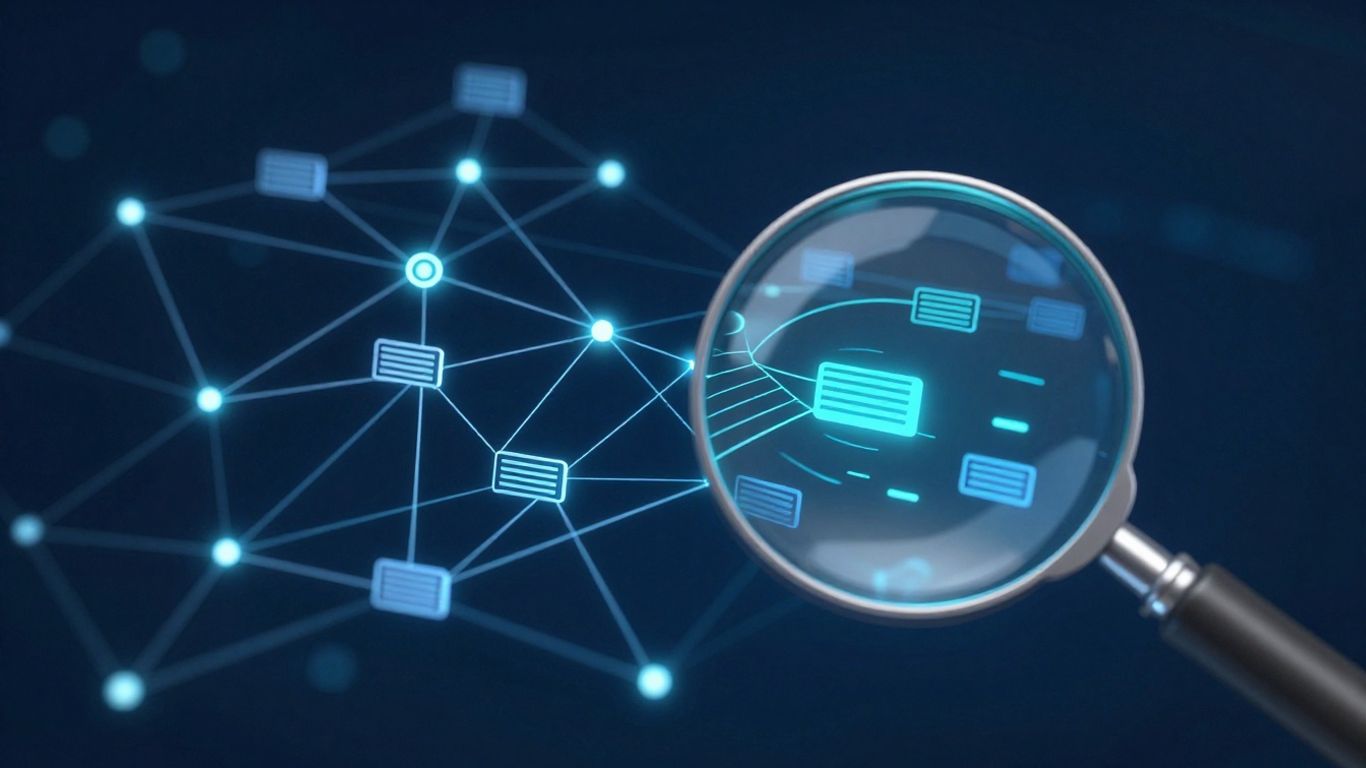[ newsletter ]
Stay ahead of Web3 threats—subscribe to our newsletter for the latest in blockchain security insights and updates.
Thank you! Your submission has been received!
Oops! Something went wrong. Please try again.
Explore how web3 and AI converge to revolutionize digital interactions, enhance security, and empower users in a new era.





Hey there! So, we're living in a pretty wild time, tech-wise. Everyone's talking about AI, right? And then there's Web3, which is all about giving us more control over our digital stuff. What happens when these two big ideas crash together? Well, it looks like we're heading into a whole new digital world, where things might be smarter, safer, and way more about us, the users. This article is gonna dig into how web3 and ai are changing everything.
Okay, so AI and Web3 together? It's kind of a big deal. Think of it like this: AI is super smart at making decisions and doing things automatically, and Web3 is all about giving people control over their own stuff online. When you mix them, you get something that's not just new, but totally different. It changes how we even think about using the internet. Imagine AI that knows what you like, but it's not snooping on you because Web3 keeps everything safe. That's the idea.
AI can really make decentralized platforms way better. It's like having a super-helpful assistant that knows what you need before you even ask. AI can help platforms give you personalized stuff, like suggesting things you might want to buy or even predicting how the stock market might move. But it's not just about making things easier. AI also helps keep your data safe and sound. It's a win-win.
Web3 and AI are changing how money and business work online. It's not just about buying and selling things anymore. It's about creating new ways for people to earn money, own their work, and connect with each other. AI can help make these new systems fairer and more efficient, while Web3 makes sure everyone has a say in how things are run. It's like building a whole new kind of internet economy.
The combination of AI and Web3 is more than just a tech upgrade; it's a fundamental shift in how we interact with the digital world. It's about creating systems that are not only intelligent but also fair, transparent, and user-centric. This convergence has the potential to reshape industries, empower individuals, and drive innovation in ways we can only begin to imagine.
Okay, so AI and Web3 are starting to team up in some pretty cool ways. It's not just theory anymore; we're seeing real applications pop up. Think about it: Web3 AI is being used in DeFi, DAOs, marketplaces, and even decentralized identities. It's powering actual systems, which is way more exciting than just talking about what could happen.
Smart contracts are already pretty neat—they're like digital agreements that run automatically. But what if they could be smarter? That's where AI comes in. AI algorithms can analyze data in real-time, making decisions and taking actions without needing a human to step in. This means fewer mistakes and faster processing. Imagine a supply chain where contracts automatically change prices based on real-time demand. That's the power we're talking about.
The integration of AI agents in the Web3 framework is set to revolutionize the digital economy by enhancing security and privacy. This evolution highlights four key trends that will shape the future of intelligent economies, focusing on the importance of safeguarding user data and improving overall trust in digital transactions. Web3 and AI are reshaping digital experiences with tailored interfaces and privacy-first solutions.
Let's be honest, some Web3 platforms aren't the easiest to use. AI can change that by creating personalized experiences. Think about AI tailoring what you see and do, like customizing social media feeds or suggesting policy changes. It's about making Web3 more intuitive and user-friendly. This can be achieved through:
Security is a big deal in Web3, and AI can help automate security protocols to keep things safe. AI can spot threats in decentralized networks, automate protections for user data, and enhance trust in digital transactions. It's like having a super-smart security guard that never sleeps. This includes:

So, I was thinking about how Web3 is all about giving people control, right? But then you have AI, which needs tons of data to actually work. It's like, how do you give AI what it needs without taking away people's data privacy? It's a tricky balance. Imagine a system where you can contribute your data to train an AI, but you still own that data and can take it back whenever you want. That's the kind of thing we need to figure out.
Web3 is all about working together, and AI needs a lot of brainpower. Why not combine them? Think about a huge, open-source AI project where anyone can jump in and help. It's like Wikipedia, but for AI. People could share data, computing power, and ideas to build something amazing. It would be a truly decentralized way to develop AI, and it could lead to some really cool stuff.
The cool thing about combining Web3 and AI is that you can get a bunch of people working together on something that no one person could do alone. It's like a giant puzzle, and everyone gets to put in a piece. This could really change how we build and use AI.
One of the biggest problems with AI right now is that it's hard to trust. You don't always know where the data came from or how the AI was trained. But what if you could build AI systems that are completely transparent and verifiable? That's where Web3 comes in. By using blockchain technology, you can track every step of the AI's development and make sure that it's fair and unbiased. This could lead to AI that people actually trust, which is a huge deal.
Getting AI and Web3 to play nice together can be tough. AI needs tons of data to work its magic, but Web3 is all about keeping things private and secure. It's a real balancing act. Developers often run into snags trying to make AI systems work smoothly with decentralized networks. Finding ways to make AI work without messing up Web3's core values is a major hurdle.
It's like trying to build a super-fast car that also runs on sunshine. You need to figure out how to get enough power without sacrificing speed or efficiency. It's a challenge, but the potential rewards are huge.
Web3 is all about decentralization, but AI sometimes needs a lot of computing power in one place to train. It's a bit of a tug-of-war. Some people are trying to use decentralized nodes to spread out the work. The trick is making sure AI can be powerful without going against Web3's main ideas.
Data privacy is a big deal in both AI and Web3, but they approach it differently. Web3 uses things like encryption and zero-knowledge proofs to protect data. AI needs data to learn, but it also needs to respect people's privacy. It's a tricky situation, but there are ways to make it work. For example, you can use techniques like federated learning, where AI models are trained on decentralized data sources without actually accessing the raw data. This way, you can get the benefits of AI without sacrificing privacy. It's all about finding the right balance and being smart about how you use data.
Here's a quick look at some of the privacy technologies being explored:
| Technology | Description
The fusion of Web3 and AI is poised to redefine how we engage in the digital world. Imagine a future where interactions are not only more personalized but also more secure and transparent. This blend could lead to new forms of digital identity, enhanced data ownership, and more collaborative online environments. It's not just about making things easier; it's about fundamentally changing the power dynamics of the internet. The Web3 in 2025 ecosystem will be a testament to this transformation.
As AI becomes more integrated into Web3, expect a shift in the job market. We'll likely see new roles emerge, such as:
These roles will require a blend of technical skills and ethical considerations, reflecting the complex nature of this evolving landscape. It's a chance to get in on the ground floor of something big.
The convergence of Web3 and AI has the potential to reshape society in profound ways. On one hand, it could lead to greater global collaboration and new forms of digital identity. On the other hand, it could exacerbate existing inequalities if not managed carefully. Labor displacement is a real concern, as AI automates tasks previously done by humans. It's important to consider the ethical implications and work towards a future where these technologies benefit everyone.
The integration of AI and Web3 is not without its challenges. We need to address issues like data privacy, algorithmic bias, and the potential for misuse. However, the opportunities are immense. By working together, we can create a digital future that is more equitable, transparent, and empowering for all.
AI is becoming a crucial tool for keeping decentralized networks safe. It's like having a super-smart security guard that never sleeps. AI constantly monitors for unusual activity, helping to quickly identify and neutralize potential threats before they can cause serious damage. It can also manage network traffic to prevent DDoS attacks, which are designed to overwhelm and cripple networks. This proactive approach is essential for maintaining the integrity and reliability of Web3 platforms.
In Web3, users are supposed to have more control over their data, and AI can help make that a reality. AI can automate many of the processes involved in protecting user data, such as:
Web3 emphasizes privacy and security, and AI plays a vital role in fortifying these aspects. AI-powered techniques can identify and mitigate security threats, detect fraudulent activities, and ensure the integrity of decentralized systems. Additionally, AI can enable privacy-preserving mechanisms, such as federated learning and differential privacy, safeguarding sensitive user data while enabling meaningful data analysis and AI model training.
AI can also play a key role in making digital transactions more trustworthy. For example, AI-enhanced smart contracts can handle complex agreements and execute them without human intervention. This not only makes the process more efficient but also reduces the risk of errors or fraud. AI can also be used to analyze transaction patterns and identify suspicious activity, helping to prevent scams and other types of financial crime. This is making processes smoother and cutting down on errors, which can save industries like supply chain management a ton of money.

Okay, so imagine your online world actually gets you, right? That's the idea here. AI can analyze your preferences and behavior (anonymously, of course!) to create interfaces that are super intuitive and personalized. Think of it like this: your favorite Web3 ecosystem adapts to you, not the other way around. And because it's built on Web3, you're in control of your data. No more creepy ads or feeling like you're being watched. It's about getting what you want, when you want it, without sacrificing your privacy.
Decentralized applications (dApps) can sometimes feel...clunky. Let's be honest. But AI can change that. By understanding how people actually use dApps, AI can help developers create interfaces that are easier to navigate and more enjoyable to use. It's about making dApps accessible to everyone, not just the tech-savvy.
Here's what AI can do for dApp design:
The goal is to make dApps feel as natural and intuitive as any other app you use every day. No more steep learning curves or confusing interfaces. Just seamless, user-friendly experiences.
AI can also make transactions on Web3 platforms way smarter and safer. For example, AI can analyze transaction patterns to detect fraud or other suspicious activity. It can also help optimize transaction fees, so you're not paying more than you need to. And with AI-powered smart contracts, agreements can be executed automatically and efficiently, without the need for intermediaries. This means faster, cheaper, and more secure transactions for everyone.
Here's a quick comparison:
So, what's the big takeaway from all this? AI and Web3 are really changing things up, and fast. They're making our online lives different, especially how we own stuff and even how we trust people on the internet. Yeah, there are still some kinks to work out, like making sure everyone gets to be a part of this new tech, not just a few. But honestly, this is just the start. The internet is always changing, and AI mixed with Web3 is going to be a huge part of what comes next. It's pretty exciting, a little bit unknown, and definitely something to keep an eye on.
AI helps Web3 by making things smarter and more efficient. It can make smart contracts work better, personalize your online experience, and even boost security by finding threats faster.
Yes, absolutely! AI can learn your preferences and tailor your experience in Web3, like suggesting content you'd like or customizing your digital space, all while keeping your data private thanks to Web3's design.
AI plays a big role in keeping Web3 safe. It can spot unusual activity that might be a hack, automate security checks, and help protect your personal information on decentralized networks.
Web3 is built on decentralization, meaning no single company controls your data. AI can work with this by processing data locally or using special methods that don't need to gather all your info in one place, keeping your privacy intact.
The biggest challenges include making AI work efficiently without centralizing data, ensuring AI models are fair and unbiased, and finding ways for AI to handle the huge amount of data needed for learning within a decentralized system.
The future looks bright! We can expect more personalized digital worlds, smarter and safer online transactions, and new jobs in areas like managing AI on decentralized platforms. It's about giving users more control and making the internet a better place.


